It’s This
You know when you stumble upon writers or bloggers who just seem to get the same issue that you’re turning over in your mind? And you read and then some of their suggestions make you go “Yes!” It’s this.
Whoa, this is a really lovely review of New Escapologist from blogger Alasdair Johnston. Thanks Alasdair!
The guy has a spare copy of Issue 15 to give away too. Read his post for instructions on how to get it. (This is extra valuable now that the magazine has almost sold out).
With Wings and Hands and Leaves
Thanks to Reader A for drawing our attention to Mandy Brown’s United Theory of Fucks.
Don’t give a fuck about your work. Give all your fucks to the living. Give a fuck about the people you work with, and the people who receive your work—the people who use the tools and products and systems or, more often than not, are used by them. Give a fuck about the land and the sea, all the living things that are used or used up by the work, that are abandoned or displaced by it, or—if we’re lucky, if we’re persistent and brave and willing—are cared for through the work. Give a fuck about yourself, about your own wild and tender spirit, about your peace and especially about your art. Give every last fuck you have to living things with beating hearts and breathing lungs and open eyes, with chloroplasts and mycelia and water-seeking roots, with wings and hands and leaves. Give like every fuck might be your last.
Nice.
*
If you give a fuck about life on Earth and zero fucks about grifting for the man, New Escapologist is the magazine for you. Respond to our beacon, hear our song.
The Good Life for Wage Slaves is also back in print. It’s a shoulder to cry on for those still trapped like a wasp beneath an upturned pint glass.
A Little Freaked Out

According to his excellently-titled memoir Every Man For Himself and God Against All, Warner Herzog’s brother is of a different temperament to our rogue filmmaker.
At the age of nineteen, he was a little freaked out because he could see his business career so clearly mapped out ahead of him all the way to eventual retirement.
He was no stuffed shirt though. To have such insight is impressive and he even planned to act on it:
So he decided to quit and see the world instead. He had a VW Beetle and planned to drive to Turkey.
Werner’s advice to his brother?
I urged him to be more ambitious and range farther afield.
*
Work vs. Work
I was trying to “work” today. My work is writing, though it is not particularly arduous writing.
Downstairs, my neighbour was playing his guitar and it was breaking my concentration. I’ve asked him before not to amplify his instrument at home (surely he could play acoustic only?) but he claims to not even be at home during the day.
The confrontation at least had the effect of him no longer playing at night, and I’m prepared to accept his lie about daytime hours: he’s a grown man who doesn’t enjoy being ticked off on his own doorstep, and he deserves to protect his dignity.
It occurs to me that it might not be right for me to complain at all though. I have, after all, turned my home into a place of work, which it was never intended to be. If I want silence perhaps I should rent a hot-desking booth in an office somewhere. Obviously I don’t want to do that because it would incur a cost and I hate going to work, but my request that this neighbour knock it off might not be morally upheld. He should be able to play guitar at home if he wants to.
Maybe work shouldn’t be done at home at all.
Then again, my neighbour seems to be practicing for something. He probably sees his guitar practice as work too. So we have a situation of “work vs. work.”
When did creativity become work?
When did work invade the home?
I know the answers to these questions because for 16 years I’ve been advocating for creativity as a way to escape drudgery and also for the sensible benefits of WFH as a way to escape the commute and the office environment.
Why do I feel like I’ve shot myself in the foot?
*
Issue 14 is sold out and is now only available in digital formats. There aren’t many copies of Issue 15 left either, so here’s where to go if you’d like a copy in print or indeed digital.
NE in DC
American readers! If you happen to be near Washington DC anytime soon, you should visit the mighty Politics & Prose Bookstore.
You should go anyway, but an additional reason is that they now stock New Escapologist.
You can see our happy little mag in this photograph. We’re snuggled in the shelving system with Sight & Sound, Apartamento and our friend Jonathan’s Analog Sea Review. The divider tag describes us as “Niche, Cheeky, Defiant,” which is true.

As it happens, this is nothing to do with the new distribution arrangement that will see New Escapologist in thirty or so shops across the UK, EU and US (news of which is coming soon).
In this case, bookseller Shane got in touch independently to request copies for sale. He was not deterred by the now-parodic cost of shipping to the US from Scotland and the order was placed. What a hero.
Honestly, little pleases me more than evidence of émigré copies of New Escapologist. Thanks for the pic, Shane, and for stocking our mag.
*
In the unlikely event that you’re not in Washington DC, you can still order Issue 15 in our online shop.
And if you happen to be a bookseller yourself, please see this page about how to stock New Escapologist.
Prior to Getting Cancer, I Had Ambitions of Becoming a Managing Director.
These past nine years have been really good, probably better than if I hadn’t had cancer. Different things became a priority: spending time together rather than worrying about having a good job or thinking you need a big house.
Here’s a long article in the Guardian about how the terminally ill spend their time. They’ve reassessed, retooled, changed their priorities.
I’ve got limited time, so I’d rather be doing things with family and friends, and having a positive impact on the world around me. I’m not in the office wearing a shirt and tie any more.
and
I wish I had gone out more with my friends. I wish I had gone to parties and stayed out late. Living life free-spirited is something I feel I missed out on, and I regret that I didn’t take advantage of that when I was younger. Life is short and you should live it how you want, regardless of what people think. Don’t hold back. Say what you want to say and do what you want to do.
and
Prior to getting cancer, I had ambitions of becoming a managing director or CEO; I wanted to achieve something in my career. Within hours of the diagnosis, that disappeared. I don’t care for work any more
When those close to the end tell us these things, what they’re really saying is: “don’t leave it too late. Think about what’s important and do it. Live while you still can.”
That’s why they write it down or say it out loud. They’re not navel gazing. They’re blowing the whistle. They’re bringing us a message from the future.
But people so rarely listen. Even these people, the dying, didn’t listen.
The truth is, you’re mortal. You don’t need a cancer diagnosis to tell you you’re dying. The cancer patients in the article might even outlive you: you could get hit by a drunk driver on your way to return an ill-fitting shirt to Primark. A piece of masonry might fall on your head.
As one future corpse to another, I’m telling you now: don’t wait. Fuck this crap! Work less, take it easy, see some of the world, be with your loved ones, look at art, help others, eat well, get laid, get off your computer, be grateful, forget about Elon Musk, ignore the crap that doesn’t matter. Take your socks off and feel the grass beneath your feet. Look at the moon and stars and think wow, we’re really on a planet. Marvel at your breath in the cold night air. Remember the faces of your grandparents.
*
Gone Fishin’

I’m reading some Philip Roth. In The Anatomy Lesson, a character says:
Maybe you are tired. Maybe you want to hang a sign on your door, Gone Fishin,’ and take off to Tahiti for a year.
I’d completely forgotten about Gone Fishin’. It’s one of of those great Boomer phrases, up there with Keep on Truckin’ and Eat at Joe’s.
In all my time thinking about escape and mini-retirements and going valiantly AWOL, I don’t think I ever remembered Gone Fishin’.
Anyway, put that sign on your door. Go to Tahiti for a year. Good advice for anyone.
*
Escape Substack?

Substack, the platform I use for the New Escapologist newsletter, is crawling with Nazis. Urgh! Readers have emailed to say they’ve unsubscribed from the newsletter for this reason. Thanks a lot, Nazis.
So should I stay or should I go? Obviously I should go. Leaving is something I’m great at! But I can’t leave without first finding an alternative, because doing so would all but end New Escapologist. An escape plan is in order.
Here’s Friend Carrie on the nature of this particular trap:
The problem for many people who publish on Substack is a problem we’ve previously seen on other platforms, including Twitter. It’s enabled people to establish an audience and in some cases a career, and that means leaving could cause financial harm to people who abandon the platform. Even if other platforms were morally pure, and very few of them are, the people demanding moral purity from their newsletter creators are rarely the people who will be financially harmed by it.
In addition, many of the people being urged to quit are marginalised people – the very people who can least afford the financial hit.
As it happens, I don’t make money from Substack. Not directly. My newsletter is free, so I’m not in particularly deep. My using the platform does not fund Nazis or (so far as I can tell) help them in any way.
But the newsletter allows me to sell the magazine (and my books via my personal list), so my bind is very similar to someone who does profit directly from Substack.
I’m sharing a platform with Nazis. Which is horrible. And embarrassing. But we all share platforms with Nazis all the time: on almost any social media platform and even the lovely Old Web is full of Nazis because there’s no moderation out there at all (though really every website is a different independent platform, so there’s always a nice little moat to separate us from the jackboot-wearing Eugenicists).
So I think “why should I go?” Obviously, I shouldn’t have to go, but equally obviously I do have to go. Yet I’m not sure there is anywhere to go. It’s a classic escape problem.
Carrie quotes another blogger (from Substack!) who airs this very frustration:
It is exhausting just trying to exist with any level of moral consistency online nowadays. And the people who keep being handed the keys to several kingdoms don’t ever bother to worry about it. They just let us tear ourselves apart trying to do the right thing while they feast. It’s all a game to them. It’s not remotely a game to us. So there’s no equivalence.
It is exhausting.
As a trans woman, Carrie is generous to give a pass to people who might not have the financial liberty to leave Naziville. I pretty much do have the financial liberty but only if I can find an adequate alternative way to send my newsletter.
So where shall I go, folks? While Substack is free, Ghost and Buttondown are expensive. Ghost in particular would cost me $199 per month, charged yearly, which is completely prohibitive. Other platforms I’ve seen are too rubbish or unreliable (or are crypto- or AI-oriented, meaning the Nazis are probably already there).
I could go back to Mailchimp, which I used for New Escapologist before Substack, but it really sucks. Its creative interface is awful and half the emails don’t make it through spam filters. One of the nice things about moving to Substack last year was reconnecting with people who thought I’d died. “You’re back!” they all said.
I don’t particularly want to stay on Substack. I have as much to lose from the rise of Fascism as anyone.
So it’s frustrating. I’d leave. I will leave, by jove! But I have no idea where to go. Answers in the comments please. Help Mr. Escape escape.
*
Prince Charles

Charles Bukowski:
How in the hell could [anyone] enjoy being awakened at 8:30 a.m. by an alarm clock, leap out of bed, dress, force-feed, shit, piss, brush teeth and hair, and fight traffic to get to a place where essentially you made lots of money for somebody else and were asked to be grateful for the opportunity to do so?
8:30?! It shows how little the onetime factotum knew about conventional day jobs. Isn’t it more like 6:30?
*
Get up at 10:30 instead. And read New Escapologist.
Xodus: Escaping Twitter At Last
I’m here to tell that you don’t need to be on Twitter anymore. The network effect is broken and you can finally escape its clutches. (And you should!)
If you’re a browser of Twitter, you probably see a lot of crap. It’s no longer your friends or even organisations you’re actually following anymore.
If you’re a creator who once used social networks to grow your audience, those followers aren’t seeing your tweets anymore. Here’s Cory Doctorow on the facts:
Six months ago, [Radio station and publisher] NPR lost all patience with Musk’s shenanigans, and quit the service. Half a year later, they’ve revealed how low the switching cost for a major news outlet that leaves Twitter really are: NPR’s traffic, post-Twitter, has declined by less than a single percentage point.
NPR’s Twitter accounts had 8.7 million followers, but even six months ago, Musk’s enshittification speedrun had drawn down NPR’s ability to reach those users to a negligible level. The 8.7 million number was an illusion […] On Twitter, the true number of followers you have is effectively zero […] because every post in their feeds that they want to see is a post that no one can be charged to show them.
Whenever I visit Twitter these days, I’m usually greeted by a single notification. The days of 20 or 40 ringing bells are long behind me. Worse, the notification is never a message or an RT or anything remotely useful. It’s inevitably a follow from a sex bot, i.e. some sort of phishing scam.
This daily non-experience, combined with how nobody sees my tweets anymore (either because they’ve sensibly left the platform or because I’m hidden by the algorithm) makes me realise… I’m free. Finally free! I can leave!
And so can you. Here are the instructions on how you too can leave Twitter.
It’s a shame really. Twitter was useful for contacting people and finding things out in realtime, but it just doesn’t work that way anymore. It’s a busted flush. I’ll probably lose touch with some people whose main point of contact is Twitter; I’ve contacted the ones I can think of to give them my email address.
The nightmare is over. No more Twitter.
In my case, it leaves me social media free for the first time in over 20 years! It was 2003 when I joined a platform called Friendster. I might eventually come over to Bluesky for fun, but for now I think I’ll enjoy the fresh air and resounding lack of network effect in my life. I advise you all to do the same. Deactivate your accounts and be free.
To celebrate what I’m calling the Xodus, I recommend reading this potted history of social media in The Atlantic magazine. It charts the incremental changes that took Twitter and Facebook from a useful database of social connections to nightmare of conspiracy theories and nonsense content that is ruining the world.
Now all I have to deal with is the problem of Substack…
*




